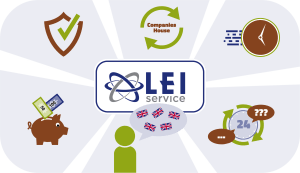Get a LEI number here
LEI (Legal Entity Identifier) is the equivalent to an international business registration number. The LEI number is mandatory for many entities, in order to trade. Get a LEI code fast and at a low cost right here. 1 year $97. 5 years from $69 per year.
Get a new LEI number same day if you order before 6 PM.
Fast and easy process
LEI number application - in 1 minute
No ACN?

LEI code prices
Find the solution with the best fit below – all our solutions include free support by phone and unlimited e-mail support.
New LEI code
Renew LEI
Renew your existing LEI code
Transfer and LEI number renewal
Transfer and LEI number renewal
Why choose LEI Service?

- Quick, easy and safe LEI registration
- Most affordable LEI number
- We have more than 24,000 LEIs under management (dec. '25)
- Automatic renewal of LEI possible
- Phone and e-mail support
- We always reply within 24 hours – guaranteed!
What is a LEI number / LEI code?
Think of a LEI-number as an international business registration number. The LEI-number is used to identify participating parties in financial transactions on a global scale.
The LEI code application has a fee, also there is a yearly maintenance fee to renew the validity. Both businesses, funds and charities need a LEI number, meaning all legal entities.
For a graphical presentation of the Legal Entity Identifer System please visit this external link.
Who needs a LEI number?
- Since 3rd January 2018 all EU legal entities subject to MiFID II was obligated to require a valid LEI in order to trade (e.g. bonds, stocks, futures etc.). Many countries outside EU has also adopted the principles, amongst those the US in the Commodity Exchange Act
- Further, companies subject to the MiFID II transaction reporting obligation are not able to accept a trade originating from a client who do not has a valid LEI number
LEI number explained in 30 seconds
- Legal Entity Identifier (LEI) is comparable to an international business number which will identify the legal entity on a global scale
- Most legal entities will need to obtain a LEI number to be able to trade stocks, bonds, etc.
- The LEI number has a registration fee and needs to be renewed on an annual basis
- Helps to prevent financial crime since all entities can be uniquely identified on a global scale
- The Legal Entity Identifier format consists of a 20-character code. The Legal Entity Identifier format is based on ISO standard 17442
- The LEI code contain information about the legal entitiy’s ownership structure and answers the questions; ”who is who?” and ”who owns whom?”
- LOU (Local Operating Units) is responsible for the issuance of the LEI code. LOUs are accredited by the Global Legal Entity Identifier Foundation (GLEIF) who publish all LEI numbers for free. LEI Regulatory Oversight Committee (ROC) regulates GLEIF
A Legal Entity Identifier example for LEI Service with the LEI: 9845 008599005596A4 56
- Character 1-4: Used to identify the issuing LOU
- Character 5-18: Specific for the legal entity, the characters do not have any specific meaning
- Character 19-20: Two verification numbers
Who can issue an LEI number?
The coordination of LEI-nummer issuance is carried out by GLEIF – a nonprofit organization with the responsibility to maintain the integrity of the global LEI system. The physical issuance of the LEI number is done by GLEIF accredited Local Operating Units (also known as LOUs).
LOUs will publish all LEI numbers and reference data to the GLEIF LEI database, which is publicly available.
GLEIF is regulated by the LEI Regulatory Oversight Committee (ROC), which is comprised of several financial institutions on a global scale.
With GLEIF you can do a free of charge legal entity identifier search. The legal entity identifier search will show if the LEI is active and when it expires.
LEI number terms
We offer a service where you just plot in your company registration number, confirm your data that is also registered with the officiel registers. Fill out info about the ownership structure, when this is done, we will make the LEI code application on your behalf and usually you will have the LEI code in a matter of hours or a few days. This applies to most cases that does not require additional information from you.
The GLEIF Legal Entity Identifier LEI database is only updated once daily, so it is not certain that your bank or investment platform will accept it. They might want to wait until it can be verified with the legal entity identifier database. (even though the LEI code is valid when issued).
It is important to make sure that the underlying information concerning the legal entities listed in the LEI Index is up to date. Therefore, the data must be updated on a yearly basis. This is considered a LEI number renewal.
LEI Service offer the possibility to purchase multiyear renewals, where we will update the LEI based on official sources. If any changes should occur, the legal entity is however obligated to inform us, so we can update the data in the GLEIF LEI Index. We do this at no cost for you.
Your legal entity will not be able to do any financial transactions since a valid LEI code is required.
The data of the LEI is referred to as the reference data. The legal entity behind each LEI are responsible notifying the LEI issuing organization of any updates to the reference data. All users of the LEI data can challenge the data contained in any LEI. Such a challenge would trigger a review of the LEI data by the LEI issuing organization. Any verification or update of a LEI is processed without any costs. This is done by the managing LEI issuer.
GLEIF are the ones in charge of monitoring LEI data quality. There is a data quality management program in place to ensure that the LEI is the best industry standard.
You can read more about data quality here.
The GLEIF LEI database is only updated once a day. It may take up to 24 hours before your bank can verify a new LEI registration. Another source of error is if your LEI has lapsed and it is no longer valid. This can be caused if you forgot to renew it and that is why you cannot conduct any trades. Let us help you renew it.
The short answer is no. However, in 2015, the LEI Regulatory Oversight Committee made public a statement stating under which conditions an individual that acts in a business capacity could be eligible to obtain a LEI code. You can read the statement here.
About the LEI system
GLEIF is a non-profit organization established by the Financial Stability Board in June 2014. GLEIF was founded to support the implementation and use LEI numbers (Legal Entity Identifiers).
GLEIF is based out of Basel, Schwitzerland. The main task of GLEIF is to ensure operational integrity of the global LEI system. GLEIF also make available the technical infrastructure for anybody who wish to access the complete global legal entity identifier LEI database.
You can find more information about GLEIF here.
In 2011, the G20 countries asked the Financial Stability Board (FSB) to make recommendations to a global Legal Entity Identifier (LEI) system and oversight of this.
This led to the development of the global LEI system, where issuance of LEI number ensures a unique identification of legal entities participating in in financial transactions. FSB underlined that a global acceptance of the LEI system will help with several financial stability goals. It also provides some advantages to the private sector.
More information on the global LEI system can be found here.
The LEI System is made up by three layers:
- Layer 1 is LEI Regulatory Oversight Committee: Consists of multiple public authorities from various nations and it was established in 2013 to coordinate and supervise the framework of the global Legal Entity Identifier system.
- Layer 2 is the Global LEI Foundation (GLEIF): Established in 2014 by the Financial Stability Board. GLEIF is a nonprofit organization meant to help with the use of and implementation of LEIs. GLEIF’s job is to ensure that the global Legal Entity Identifier system has operational integrity.
- Layer 3 is LEI issuing organizations: The issuers of LEIs are also called Local Operating Units (LOUs). LOUs handle LEI registration, LEI renewal and complementary services.
You can find more information here.
The Legal Entity Identifier (LEI) links key data enabling a unique identification of legal entities that participate in financial transactions across the globe. The LEI data is made publicly available to create and improve transparency in the global markets.
The free information provides standardized information on legal entities on a global scale. The data incorporated in each LEI is verified through procedures and protocols set by the LEI Regulatory Oversight Committee. The Global LEI System job is essential to answer three questions: Who owns whom? Who is who? And who owns what? Who is who is answered in the “level 1 data”. To answer the question process “who owns whom”, “level 2 data” has been included as well.
The LEI number is a 20-digit code that businesses, funds and charities who want to either buy or sell financial instruments may have to obtain in order to comply with MiFID II regulation. No LEI, no trade.